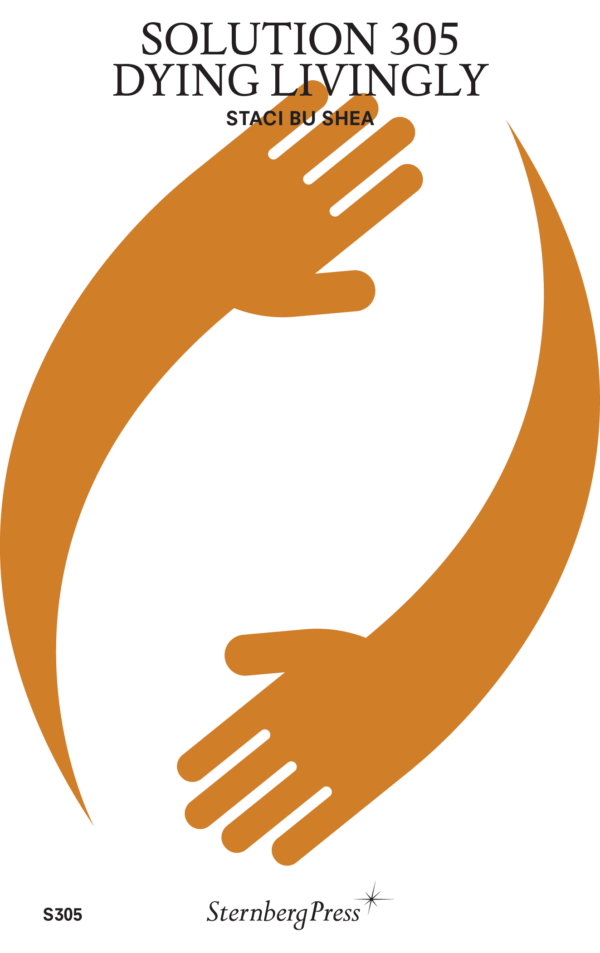Staci Bu Shea
Staci Bu Shea

Solution 305 – Dying Livingly
A series of propositions and encounters in service to an aesthetic, critical, and poetic experience of living life led by death.
Part studious, part visceral, Dying Livingly is a collection of short essays written in the first few years of the author's holistic deathcare research and practice. With a focus on the truth of impermanence and the material cultures of death and dying, the writing reaches toward a future of compassionate, community-centered deathcare.
Death has been outsourced, medicalized, and commodified for over a century. Existing at a threshold of innovation and transformation today, death is not a plight to master or transcend but a reality of insistent change requiring our humble surrender. Working in tandem with the possibilities and limits of medicine, the holistic deathcare movement aims to support people and their communities in death literacy and phobia. It stewards both ancient and new practices in deathcare and centers social, political, and ecological imperatives for how we die.
If death is an amplification of living, the attention here is on bearing witness to life in and around the dying and the potential to contribute to a more vibrant culture of care. Living a death-oriented life is not simply for those and their loved ones navigating a terminal diagnosis and finite amount of time to live; it is for all of us. Death awareness leads to a valuing of life, which is urgently needed for justice, healing, and our livability.
With fervor and deep reverence, this collection demonstrates that what is needed above all is a presence—simple but challenging—that refuses to look away as life slips from our grip. In this light, the writing details lessons in what it means to be prepared for death but also impossibly ready. Death is a horizon that inspires us to live fully, with the vulnerability necessary in the transformative process of giving and receiving care.
Staci Bu Shea (born 1988 in Miami) is a curator, writer, and holistic death care worker based in Utrecht, the Netherlands, focusing on aesthetic and poetic practices of social reproduction and care work, as well as its manifestations in interpersonal relationships and daily life, community organizing and institutional practice.
And more

Girls Like Us #14 - Letters of Disappointment
Marnie Slater, Katja Mater and 2 more
Considered an ‘ugly feeling’ by society’s norm, we’re not supposed to vocalize what and who is letting us down. We’re supposed to stay positive, get organized and act, instead of lingering in negative emotions. We’re supposed to be productive. But making space for disappointment can be a strategy of dissensus. Instead of wallowing in impotence, to make explicit what is not meeting expectations for this world can be an act of renouncing and making cracks in the status quo, while not giving up allegiance that another world is possible.
In Living a Feminist Life, Sara Ahmed writes: ‘we might think of how becoming feminist put us in touch with all that sadness, all those emotions that represent a collective failure to be accommodated to a system as the condition of possibility for living another way.’
In this issue we hope to plant the seeds of this rebellion by collecting a larger body of letters of disappointment. No matter how vague, impersonal, unimportant, futile, banal, or contingent these memories may seem; when shared and brought into a wider collective context, political desire may slip out from between the lines and build a corpus of transfeminist inheritance.
While spending some time with a tarot deck in preparation for this issue we obviously pulled the card of disappointment. In this deck, the illustration shows a beautiful drought: five crystal cups, which in the other cards overflow with fresh water, are shown here empty and dry.
‘The Five of Cups stands for an emotional crisis. It might be that unconscious fears come true, it could tell that feelings are disrupted or wasting away, the soul is empty and unfulfilled. In the sequence of the cups, the Five is the logical consequence of the Four. The grey tristesse that was lurking behind the luxury’s glamour is now exposed, the ‘truth is out’. The Five of Cups implies the loss of illusion, the realization of a deception. It hurts, but is necessary when we don’t want to spend the rest of our lives with our heads in the sand.’
We leave it up to you to imagine the possibilities or boundaries of what spending time with disappointment can make happen, for you, in your community, in the world.
Contributors: Pelumi Adejumo, Clara Balaguer, Dagmar Bosma, Staci Bu Shea, Alba Clevenger, Athena Farrokhzad, Sharona Franklin, Maike Hemmers, Calla Henkel, Sara Kaaman, Alena Kolesnikova, Maoyi (Peixuan Qiu), Katja Mater, Yelena Moskovich, Djuwa Mroivili, Sands Murray-Wassink, Raoni Muzho, Iarlaith Ni Fheorais, Ashley Nkechi Igwe, Milica Trakilović, Shola von Reinhold, Selma Selmani, Terre Thaemlitz, Yin Yin Wong, Anna Zvyagintseva, Sophie Zwertbroek, Joanna Walsh, Rosa Luxemburg, Yoyes Maria Dolores Gonzalez Katarain, Clara Zetkin, Alexandra Kollontai and Audre Lorde